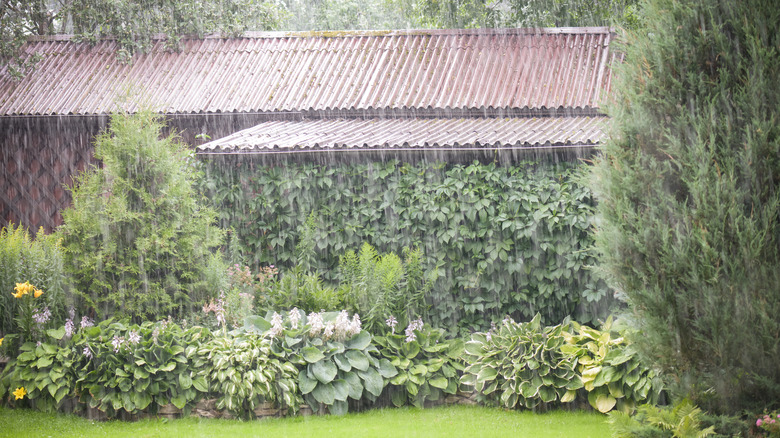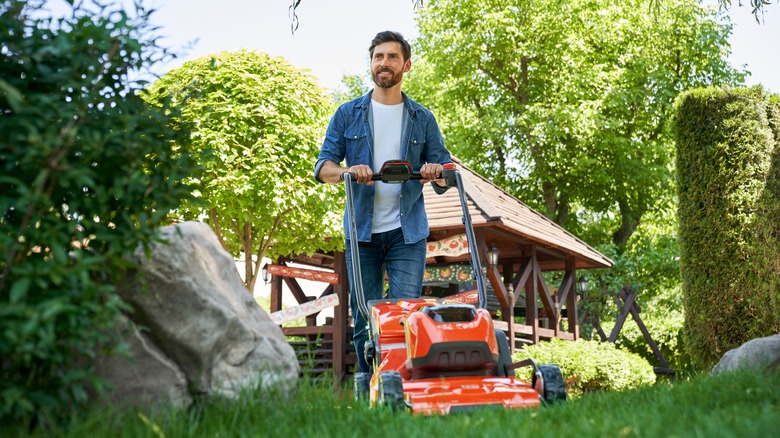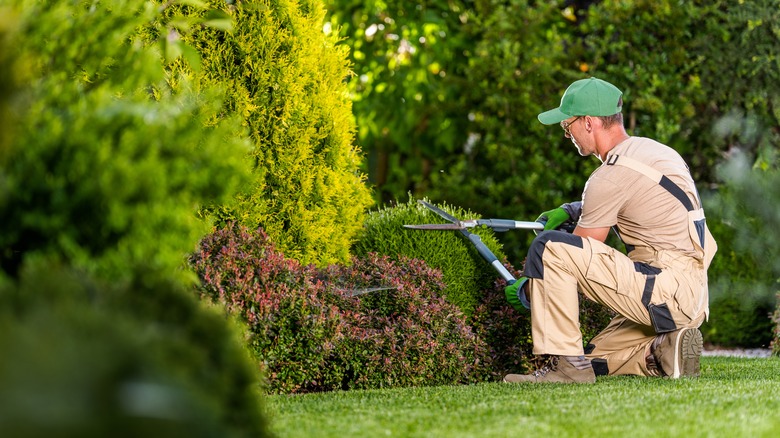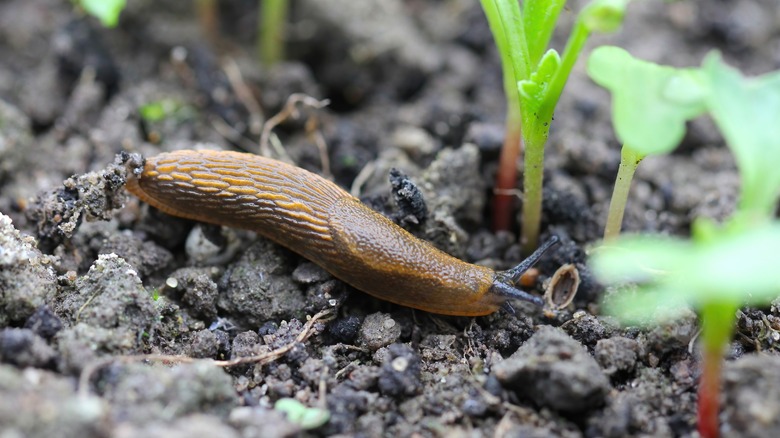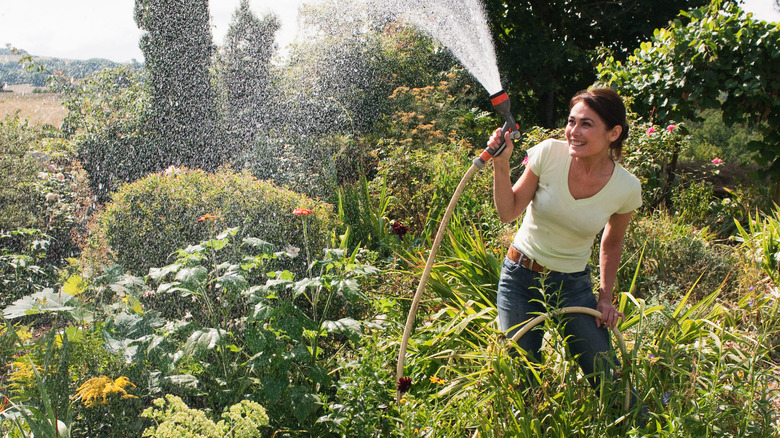Don't Do Any Of These Things To Your Garden After A Heavy Rain
Heavy rainfall is a natural blessing for gardeners, offering much-needed hydration to thirsty plants and rejuvenating the landscape. However, as with any blessing, there can be too much of a good thing. After a deluge, our first instinct may be to step out in our yard in order to capitalize on this fresh abundance of moisture. However, the notion that our gardens require immediate attention in their newly wettened state is a myth.
In our eagerness to tend to our beloved green spaces, it's crucial to exercise caution and restraint. While it may be tempting to dive straight into garden maintenance tasks like pruning, fertilizing, or mowing, doing so can actually do more harm than good. Today, we're exploring the don'ts of gardening practices following a heavy rainfall. Read on to discover the five things you certainly shouldn't do to your lawn after a downpour. By avoiding these mistakes, you'll ensure your garden thrives in the wake of nature's bounty rather than suffering from misguided interventions.
Mow your lawn
Mowing your garden immediately after heavy rain might seem like a practical task to catch up on overdue lawn maintenance. You might even believe that mowing the grass will help the water better seep into the soil. However, in actuality, mowing your lawn after a heavy downpour is counterproductive and potentially harmful to your lawn's health.
Wet soil, in its weaker state, is more susceptible to pressure than dry soil. As such, the weight of a lawnmower can cause the wheels to sink into the ground, leaving ruts and tracks. This can compact the soil and reduce pore space. This restricts the movement of air, water, and nutrients that are important for root growth and overall soil health. With less access to these resources, your lawn could lose its vibrancy and liveliness.
When it comes to the actual blades of your grass, mowing a wet lawn poses another series of issues. Wet grass blades weigh more when they are damp or soaked. This causes them to droop rather than stand upright. When a mower passes over these bent grass blades, there's a higher likelihood that the grass will get caught and torn by the lawnmower rather than cleanly cut. With damage like this, your lawn is more susceptible to disease and pests. Wet grass is also more likely to clump together. This can clog your lawn mower, reducing its efficiency and increasing the frequency of intervals you have to buy a new one.
Apply pesticides or fertilizers
Following heavy rains, spraying pesticides or applying fertilizer isn't just potentially harmful; it's plain ineffective. With heavy amounts of water flowing through your lawn, any chemicals you apply are likely to be washed away. Instead of being absorbed by plants or soil, these chemicals are carried away by runoff. Not only do you waste your resources, but you can also potentially contaminate public waterways this way and cause environmental damage. This is why it's often best to opt for natural pest-repellents, which won't contribute to this widespread damage.
Any nutrients that do remain may not be absorbed by your plants either. This is because wet plants and soil may already be saturated with water, making it difficult for these chemicals to penetrate and reach their intended targets. If the chemicals are not washed away, and instead sit in the waterlogged conditions for prolonged periods of time, they can contribute to nutrient imbalances or even toxicity, damaging plant roots, inhibiting growth, and reducing overall plant health.
Prune your plants
Just as grass enters a weakened state when it is wet, so do other shrubs and plants. It's important to remember that wet conditions create ideal environments for fungal diseases to thrive, hindering the growth of your plants, or altering their appearance for the worse. When pruning plants, you essentially create open wounds in the plants leaves or stems. When wet, these cuts are more susceptible to fungal infections. When plants are stressed from excess moisture, these infections can spread all the more rapidly.
Beyond infection, pruning stressed plants can cause additional tearing or bruising. Not only is it harder to assess and prune effectively, but achieving an accurate cut on a wet leaf or stem is more difficult, especially if the plants are weighted down or warped due to the weight of the water. This unnecessary damage can lead to delayed healing and inhibit their ability to grow vigorously and healthily afterward.
Ignore snails and slugs
Mollusks, such as snails and slugs, become active during rainy weather for a number of reasons. Their soft bodies require moisture to stay hydrated and mobile, which they easily obtain by emerging aboveground on a rainy day. With increased mobility, they can explore new areas in search of food and shelter. Additionally, they are better able to breed and reproduce when humidity is high, leading to increased populations in garden areas.
After a rainfall, it is wise to inspect your garden for these slimy creatures. While they are important aspects of natural ecosystem balance, too many of them can cause widespread destruction to foliage, flowers, and young seedlings. Look for telltale signs like slime trails on plants, pots, and other garden structures you've installed. Try to remove any boards, rocks, or dense vegetation that can provide dark, damp shelter for them. Using gloves, pick them off plants and relocate them away from your garden. You can keep them in a bucket of soapy water to transport them.
If you're squeamish and would generally prefer to avoid interactions with these slithering critters, you can also plant garlic bulbs or sprinkle vinegar in your garden every so often. This should prevent them from rising up when the weather gets rainy.
Water your garden
As we know, heavy rainfall saturates your garden with moisture, often providing more water than your plants actually need at one time. Watering post-rainfall is akin to overwatering, a major watering mistake. The excessive water can lead to waterlogging, a condition where the soil becomes oversaturated, depriving plant roots of much-needed oxygen. This can lead to plant stress and root rot, harming the health of your yard.
Beyond that, some heavy rains can wash away valuable topsoil, exposing plant roots and leaving them vulnerable to damage from the elements. Additional watering can exacerbate soil erosion and further loosen the soil, taking away vital nutrients and protection that your plants rely on for growth and stability.
Beyond the direct impacts on your lawn, watering after a heavy downpour is a waste of energy and resources. There simply isn't a need to consume valuable freshwater and run bills high when Mother Nature has already showered your lawn.
